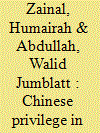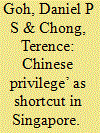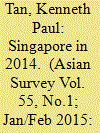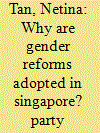|
|
|
Sort Order |
|
|
|
Items / Page
|
|
|
|
|
|
|
| Srl | Item |
| 1 |
ID:
180733


|
|
|
|
|
| Summary/Abstract |
ON NOVEMBER 9, 2020, President of Azerbaijan Ilham Aliyev, Prime Minister of Armenia Nikol Pashinyan and President of Russia Vladimir Putin signed the Statement on a Ceasefire in Nagorno-Karabakh.
|
|
|
|
|
|
|
|
|
|
|
|
|
|
|
|
| 2 |
ID:
178056


|
|
|
|
|
| Summary/Abstract |
This article contributes to a more nuanced understanding of privilege as a conceptual category through the case study of Chinese privilege in Singapore politics. It does so through two main ways. First, at the theoretical level, we emphasise the importance of foregrounding the salience of political hegemony in the analysis of privilege. Second, at the empirical level, we interrogate the concept in an Asian context, with specific reference to Singapore. We argue that the existing focus on class privilege within the ruling People’s Action Party (PAP) should go hand-in-hand with the study of Chinese privilege since PAP hegemony has significant implications on how race is constructed, understood and implicated in Singapore politics and society. Furthermore, PAP’s race-based approach to politics inadvertently perpetuates Chinese privilege, as exemplified by contradictions in minority representation in parliament and the clash between Chinese privilege and the government’s system of meritocracy.
|
|
|
|
|
|
|
|
|
|
|
|
|
|
|
|
| 3 |
ID:
185506


|
|
|
|
|
| Summary/Abstract |
We disagree with Humairah Zainal and Walid Jumblatt Abdullah that Chinese privilege exists in Singapore politics and that it is perpetuated by the political hegemony of the long-ruling People’s Action Party (PAP). Consequentially, we disagree that ‘Chinese privilege’ is thus a useful concept for understanding politics in Singapore. Our rejoinder argues that ‘Chinese privilege’ is under-specified and decontextualized by the authors, used uncritically as a shortcut for the consequences of the long-ruling party’s political hegemony for ethnic relations, and is therefore a polarizing distraction to the critical analysis required to advance anti-racism discourse and understanding in Singapore. We show that the authors have mistook incumbent political privilege for Chinese privilege. We argue that ethnic majority and minority Members of Parliament from both governing and opposition parties have had to simultaneously serve as community leaders and transcend ethnic affiliations to represent national interests.
|
|
|
|
|
|
|
|
|
|
|
|
|
|
|
|
| 4 |
ID:
137911


|
|
|
|
|
| Summary/Abstract |
In the ‘‘new normal’’ following the 2011 general election, Singapore seems poised for further development toward liberal democracy. However, the ruling People’s Action Party is attempting to reinvent itself and regain its hegemonic position, which requires finding credible solutions for very challenging problems to do with policy, communication, and public image.
|
|
|
|
|
|
|
|
|
|
|
|
|
|
|
|
| 5 |
ID:
185210


|
|
|
|
|
| Summary/Abstract |
Singapore remained in crisis mode in 2021, a situation that persisted from 2020. While COVID-19 continued to devastate various foundations of Singapore, especially the economy and public confidence in the government, a political succession crisis threw the republic deeper into uncharted territory. These developments are likely to have long-term consequences, especially for the staying power of government in what is a one-dominant-party state.
|
|
|
|
|
|
|
|
|
|
|
|
|
|
|
|
| 6 |
ID:
190043


|
|
|
|
|
| Summary/Abstract |
As in 2021, Singapore in 2022 remained largely in crisis mode despite resolving the keystone issue of political succession, with a prime-minister-in-waiting clearly in place. Still, COVID-19, together with the continued US–China economic and political conflicts, the negative fallout from the Russian invasion of Ukraine, and the anticipation of a possible recession in 2023, continued to cast dark clouds over Singapore and its politico-economic future. These developments were somewhat counterbalanced by positive developments in regional diplomacy, which acted as possible shock absorbers of negative fallout from outside the region. Still, Singapore appears to be at a crossroads, with political changes at home being challenged by external developments, and with the shape of things to come in Singapore remaining largely unknown.
|
|
|
|
|
|
|
|
|
|
|
|
|
|
|
|
| 7 |
ID:
145756


|
|
|
|
|
| Summary/Abstract |
In Singapore, the percentage of elected female politicians rose from 3.8 percent in 1984 to 22.5 percent after the 2015 general election. After years of exclusion, why were gender reforms adopted and how did they lead to more women in political office? Unlike South Korea and Taiwan, this paper shows that in Singapore party pragmatism rather than international diffusion of gender equality norms, feminist lobbying, or rival party pressures drove gender reforms. It is argued that the ruling People’s Action Party’s (PAP) strategic and electoral calculations to maintain hegemonic rule drove its policy u-turn to nominate an average of about 17.6 percent female candidates in the last three elections. Similar to the PAP’s bid to capture women voters in the 1959 elections, it had to alter its patriarchal, conservative image to appeal to the younger, progressive electorate in the 2000s. Additionally, Singapore’s electoral system that includes multi-member constituencies based on plurality party bloc vote rule also makes it easier to include women and diversify the party slate. But despite the strategic and electoral incentives, a gender gap remains. Drawing from a range of public opinion data, this paper explains why traditional gender stereotypes, biased social norms, and unequal family responsibilities may hold women back from full political participation.
|
|
|
|
|
|
|
|
|
|
|
|
|
|
|
|
|
|
|
|
|